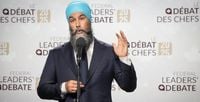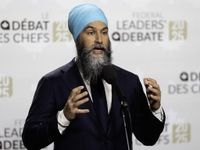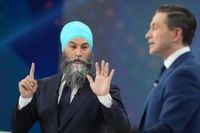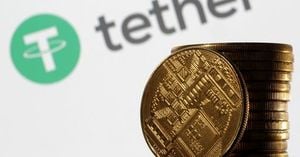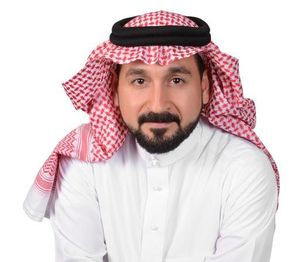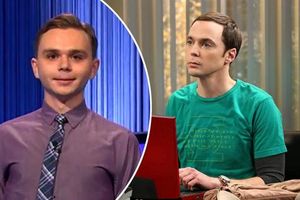OTTAWA — The French-language debate on April 16, 2025, became a focal point for NDP Leader Jagmeet Singh, who found himself at the center of controversy when his microphone was cut to halt his speech. The incident occurred after Singh accused other party leaders of wanting to cut health care, prompting moderator Patrice Roy to intervene due to time constraints.
During the debate, Singh's name was called twice before Roy counted to three, signaling that it was time to move on. Singh, however, continued speaking, leading Roy to instruct his producers to cut the microphone. “Cut the mic,” Roy said, explaining afterward that he had allowed Singh to speak longer earlier in the debate but needed to keep to the schedule.
After the microphone incident, Singh expressed his frustration, stating, “During this debate, I tried to raise the question of health a few times and Mr. Roy stopped me several times.” He noted that the clock indicated he had spoken for just 18:46 minutes compared to his opponents, who spoke for around 22 to 23 minutes. Ultimately, Singh's total speaking time reached 22:10 minutes, while the other leaders averaged closer to 25 minutes.
In his closing remarks, Roy apologized for the interruption, acknowledging the need for a smoother flow in the debate. Singh later reflected on the situation, saying he felt passionate about the health care topic and was proud to advocate for free and universal health care, a core value for his party.
“It is so fundamental to who we are as a country. We fundamentally believe that we should take care of each other, and health care represents that value,” Singh emphasized.
The debate also featured Singh's refusal to engage with questions from Rebel News, a right-wing media outlet. Reporter Alexandra Lavoie pressed Singh for his views on internet censorship against conservative media, but he rebuffed her, stating, “I’m not going to respond to an organization that promotes misinformation and disinformation like Rebel News.”
When another Rebel News reporter, Drea Humphrey, asked Singh to condemn hateful attacks on Christians, he reiterated his stance and pointedly refused to answer. Post-debate, Humphrey expressed her disappointment on social media, criticizing Singh's response as dismissive.
“SHAME,” she posted. “Mr. ‘Anti-hate’ Jagmeet Singh just called the church burnings spree in Canada ‘misinformation.’” This exchange sparked mixed reactions among Canadians, with some praising Singh for standing firm against what they perceived as a biased media outlet, while others criticized him for dismissing legitimate questions.
With less than two weeks until Canadians head to the polls, the political landscape is shifting. Singh's performance in the debate, coupled with his refusal to answer questions from certain media, raises questions about his leadership and the NDP's positioning in the current election cycle.
Meanwhile, the Conservative Party of Canada, which previously spent millions on attack ads against Singh, finds itself in a complicated situation. Back in the summer of 2024, the Conservatives released an ad featuring Singh on the cover of a fictional magazine titled "Luxury Pensioner Monthly," showcasing luxury items like Rolex watches and a BMW. The ad claimed Singh needed to delay the election until 2025 to qualify for a $2-million pension and accused him of selling out to Prime Minister Justin Trudeau.
Despite the attack ads, Singh's leadership has come under scrutiny, particularly as polls indicate that the NDP is struggling to gain traction. Liberal leader Mark Carney has reinvigorated the Liberal Party, attracting voters who previously supported Singh. The political environment has shifted dramatically, and Singh is now seen by some as an extension of the Trudeau Liberals.
Conservative leader Pierre Poilievre has also targeted Singh, suggesting that he lacks the leadership qualities necessary to effectively challenge the government. In October 2023, he remarked, “It is like a parallel universe every time the NDP leader stands up and attacks the very government he’s a part of.” This sentiment has resonated with voters who are seeking change.
In November 2024, Poilievre leveraged Singh’s own criticisms of Trudeau, turning them into a non-confidence motion that forced Singh into a difficult position. By choosing not to support the motion, the NDP leader was seen as undermining his own statements, further complicating his party's image.
The dynamics of this election are influenced by several factors, including the desire for change among Canadians, the impact of the Trump factor, and the importance of strategic voting. Singh's struggle to define his party and its direction has left him vulnerable to criticism from both the Conservatives and the Liberals.
As the English-language debate approaches, scheduled for April 17, 2025, Singh's performance will be closely scrutinized. The stakes are high, and with the NDP polling in the single digits, the pressure is mounting for Singh to articulate a clear vision that resonates with voters.
Ultimately, Singh's ability to navigate these challenges and effectively communicate his party's platform will be crucial in the days leading up to the election. The political landscape is fluid, and Singh must work to regain the confidence of voters who are increasingly looking for a viable alternative to the status quo.
